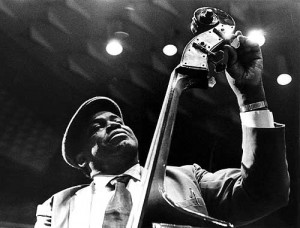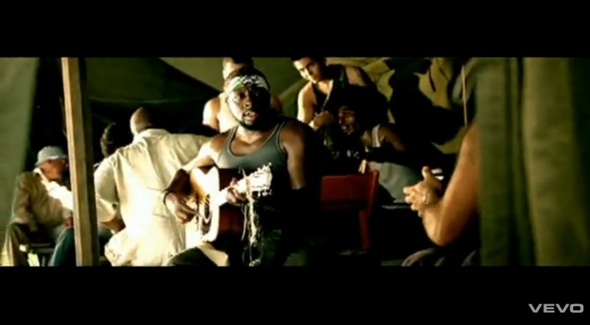Let’s address the obvious questions first: why “Sweetest Girl,” a moderately successful pop track that’s three years old? Why Overthink it now? And why is Perich doing it, as opposed to Lee or Stokes or Belinkie or Fenzel or really anyone who knows anything about music?
To tackle those in reverse order: Perich is doing it because no one else stepped up. Although some of the other writers provided some insightful comments; I’ll call those out below.
Why now: because Lil’ Wayne hasn’t put out any new tracks in a while, being in jail. Wyclef might not put out any new tracks for a while, since he’s running for President of Haiti. So this is what we have available.
And why this song: oh, wow. It is just rife with meaning.
First, consider the lyrics.
Some live for the bill, some kill for the bill
Some wine for the bill, grind for the bill
Some steal for the bill if they got to pay the bill
Tonight Wyclef, Akon, Weezy [Lil’ Wayne – Ed.] on the bill
Wyclef makes use of a triple-antanaclasis here with three different meanings of the word “bill.” The first, the most common one throughout the song, is a bill as in currency – the “dollar dollar bill, y’all.” The second is a bill as in an invoice for services, like a water bill – “if they got to pay the bill.” The third is the bill as in the marquee of performers – “Tonight Wyclef, Akon, Weezy on the bill.” [hat tip to Jordan Stokes for the two-dollar word there]
What’s the effect of this identity rhyme? It ties into the theme that we’ll explore later in the chorus – that the presence of cash in the world is inescapable. Every aspect of your life touches on a bill. Wyclef, Akon and Lil’ Wayne are on the bill tonight (the marquee). Why? So they can make the bills (dollars) to pay the bills (invoices). It’s almost as if this single syllable rules everything around them.
High school, she was the girl that make me do the hula hoop around the gym
(Just to get a peek again, she’s a 10)
High school, she was the girl that make me do the hula hoop around the gym
(Just to get a peek again, she’s a 10)
Wyclef Jean demonstrates some real mastery of lyricism here, always one of his stronger suits. He doesn’t just say “this chick was hot.” He doesn’t just say “this chick was hot like [insert halfway clever metaphor].” He describes the behavior she provoked in him: he had to “do the hula hoop around the gym / just to get a peek again.” This evokes clear imagery: a scrawny teenage Wyclef, struggling to keep a hula hoop in rotation as he does a lap of the gym, to get a glimpse of this girl’s … legs? bra? It’s not made explicit, in order to retain the innocent tone.
Never thought she would come and work for the President
(Mr. George Washington)
Now this is an odd one. Wyclef sets up an internal dramatic irony here. We start with the bittersweet disappointment in his voice: “never thought she would come and work for the President.” Wha? Isn’t working for the President a great honor? Wasn’t that what The West Wing was trying to teach us all these years? Something’s not right here!
Then we get the clarification in the call-out: “Mr. George Washington.” Ah – that’s better. George Washington doesn’t have much of a staff in the 21st century, being dead, but his image lives on in the one dollar bill. So the Sweetest Girl isn’t working for the President. She’s working for those dead presidents: a common euphemism in hip-hop culture for dollars.
This is the song’s first call-out to an older and more famous hip-hop track: in this case, Jay-Z’s “Dead Presidents” off of his debut album Reasonable Doubt. One of the sharpest tracks off of Jay-Z’s critically acclaimed debut, it is – like the best hip-hop of the 90s – a tribute and lament to the struggle of earning money. Of course, Jay-Z owes some credit to legendary blues man Willie Dixon and his song “Dead Presidents”:
Hamilton on a ten can get you straight,
But Jackson on a twenty is really great.
And if you’re talkin’ bout a poor man’s friend
Grant will get you out of whatever you’re in.

Of course, talking about the debt that hip-hop owes to the blues would merit a post all its own (or a Fenzel-level tangent). Suffice it to say, “dead presidents” is not an original metaphor.
Which is fine. It’s not supposed to be. “Sweetest Girl” is all about invoking the wisdom of the elders. More on that later.
She had a good day, bad day, sunny day, rainy day
All he wanna know is: where my money at?
Closed legs don’t get fed, go out there and make my bread
All he wanna know is: where my money at?
She ended up in the wrong car, bruised up, scarred hard
All he wanna know is: where my money at?
To keep track of the narrative so far: this girl grew up in Wyclef’s neighborhood and went to school with him. Now she’s a prostitute.
The litany of personal woes and the response of “Where my money at?” evokes a bit of voice-over narration from the 1990 movie GoodFellas:
Now the guy’s got Paulie as a partner. Any problems, he goes to Paulie. Trouble with the bill? He can go to Paulie. Trouble with the cops, deliveries, Tommy, he can call Paulie. But now the guy’s gotta come up with Paulie’s money every week, no matter what. Business bad? Fuck you, pay me. Oh, you had a fire? Fuck you, pay me. Place got hit by lightning, huh? Fuck you, pay me.
This is another classic which would be known to any hip-hop aficionado. Hip-hop in the 90s was 80% Goodfellas, Scarface, King of New York and New Jack City, 15% comic books and 5% Neil LaBute lines about women before LaBute wrote them. Again, Wyclef is invoking common wisdom: the old mythology, the classic songbook, the collective unconscious.
But he’s doing it in service of a different theme. There’s a huge catalog of songs that glorify the job of pimping. Most of Snoop Dogg’s catalog, a good bit of Dr. Dre’s as well, Big Daddy Kane’s “Pimpin’ Ain’t Easy.” Hell, a song depicting the hard life of pimps won an Academy Award just a few years back.
There aren’t as many songs talking about how cruel pimps are to the women in their stable, though. That’s what Wyclef wants to uncover for us. And to break through the generations of pimp-glorification, he needs to touch on references that’ll resonate for a hip-hop audience. There’s Jay-Z and his “Dead Presidents.” There’s Goodfellas. And there’s one more big one.

This was great interpretation. And this is about the only rap song I’ve heard where the woman isn’t property or a problem, so I appreciate you spotlighting it.
Fantastic, but I’m holding you to writing that blues/hip-hop article eventually. (Or for Fenzel to shoehorn it into an entirely different article.)
All right, Internet, consider the gauntlet thrown. Can you overthink Lil Wayne’s verse?
I’ll even save you the trouble of looking it up on lyricsfreak:
———
She used to be the sweetest girl ever (whatever)
Now she like Sour Amaretto
She wears a dress to the T like the letter
And if you make it rain she will be under the weather
She used to run track back in high school
Now she tricks off the track right by school
She takes a loss cos she don’t wanna see her child lose
So respect her, or pay up for the time used
And then she runs to the pastor
And he tells her there will be a new chapter
But she feels no different after
And then she asks him… Where the money at?
“Around me” and “including me” are different concepts. There is a division between ones environment and oneself inherent in the phrase; at the same time there is a link between the words to make the phrase, much like the link between environment and self. The division between environment and self, as well as the unification, come through perception and experience – products of education, both books smarts and street smarts, and are all notable contrasts.
Wyclef’s introduction to the sweetest girl, who he once would do anything for due to primal urges, is a contrast between his lack of education as a youth and his education as a man. The result of this education is that whilst he can appreciate that the world around him is about the papers, and that he must interact with it as such, he need not be such a complete slave to it. He can serve higher ideals, such as overthinking the circumstances of others and helping them if possible – in the first instance it is the sweetest girl and in the second it is the refugee, but the most important is the audience whom he is trying to educate.
The lyrics of Lil’Wayne are all about contrast. This is both in terms of individual lines, couplings, and the entirety. The line “she use to be the sweetest girl ever (whatever)” is a contrast between pleasant (sweet) and unpleasant (whatever), though the overall image is pleasant. The next line contrasts unpleasant (sour) and pleasant (amaretto) in a reversal, with the overall image being unpleasant – this contrasts with the first line. The following lines can be creatively interpretted in this manner; i.e. the dress is curvy, the letter T is not, sexy dressed up vs unhealthily under the weather.
The series of twelve lines expressed by Lil’Wayne further contrasts at the halfway mark. The first six explore how she was and how she now is, and do so without compassion – this is most pronounced is in the first two lines with “whatever” and “sour” which do little to promote sympathy, and are keeping with past Hip Hop expressions for prostitutes. The following six however explore her on a more compassionate level, pronounced by her reasons (her child) and a command for respect, unlike most Hip Hop lyrics. Lil’Wayne further contrasts her fall from grace with her attempt to regain it, though with the result being she progresses to a victimiser – like her pimp, she’s demanding money.
Lil’Wayne himself offers further contrast. As noted, he is not an immigrant and he is arguably the odd one out in terms of style and subtlety. Just as Lil’Wayne completes the circle of hip-hop, he also completes the circle of education – the victims (we who need to be educated), the victimisers (those who take advantage of the uneducated), and those who have transcended this through being educated and educating others (all to varying degrees). Of note is that Wyclef is now running for President whereas Lil”Wayne is in prison. The placement of Lil’Waynes lyrics in the song are in line with the process, with the end lyrics being the attempt to educate others, just as the singers have been educated by others.
::slow clap::